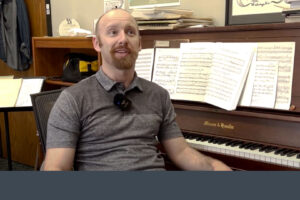AUSTIN, Texas—As the Texas population ages and becomes more ethnically diverse, Texas German, one of the state’s early dialects, may become extinct, according to a researcher at The University of Texas at Austin.
Every month, Hans Boas travels to communities throughout Texas—from Crawford to Fredericksburg to Boerne and New Braunfels—to interview speakers of a unique German dialect that blends 19th century German with hearty doses of English.
“As the Texas population changes, some languages will become more widely spoken such as Spanish, while others will move out of the mainstream such as Czech, Swedish and German,” Boas, an assistant professor of Germanic studies, said. “Texas German was the first language of many of the state’s settlers, so it is important to preserve the dialect.”
After visiting Fredericksburg where Texas German is spoken in shops and restaurants, Boas became fascinated with the dialect that features words such as der Cowboy (Cowboy spoken with a German accent) and die Stinkkatze (skunk, or simply stinky cat).
Boas recruited a small team of students to examine and preserve the language of the Germans who once dominated central Texas’ cultural landscape. The Hill Country became known as a part of the “German Belt” in the late 1900s when immigrant schoolchildren and newspaper readers learned about the world in their native language.
During the 1990 U.S. census, almost 3 million Texans claimed some German ancestry. But, during the past four decades, newer generations have not spoken Texas German.
Today, there are fewer than 8,000 speakers of the dialect. Most of these speakers are between 60 and 70 years old. Because the number of native Texas German speakers will shrink drastically during the next two decades, Boas predicts the dialect will become extinct by 2040.
Boas and the students have recorded almost 200 Texas German speakers and preserved more than 350 hours of the interviews in digital format.
As part of the project, Boas has created a Web-accessible database of audio and textual materials from Texas German. The archive maintains audio and video recordings of sociolinguistic interviews conducted with native speakers of Texas German. These irreplaceable recordings allow researchers to analyze the linguistic features of the dialect—from grammatical patterns to phonology, the way sounds function in a language.
In addition to completing interviews about Texas Germans’ lives, families and local history, the researchers compile translations of English words, phrases and sentences into Texas German. This archive allows users to access the Texas German translations in order to compare how the same words, phrases and sentences are pronounced differently throughout Texas.
“It also is important to create a popular account of Texas German to share with local schools, preservation societies and museums,” Boas says. “The dialect is part of the culture’s legacy, but it is rapidly eroding.”
Beyond Texas, the preservation of the dialect is critical to understanding language development in general. Throughout the world, there are 6,000 languages spoken today. But, researchers predict half of these languages will be lost by the end of the century.
“Every time we lose a language, we lose a data set. If researchers have more data, we can create and test theories about how language works more accurately,” Boas said.
For more information, visit the Texas German Dialect Project Web site.
For more information contact: Hans Boas, assistant professor, Department of Germanic Studies, 512-796-3046; Christian Clarke Casarez, director of public affairs, College of Liberal Arts, 512- 232-6358.



